Picture this: you’re sipping freshly brewed coffee in a trendy Seoul café, your laptop humming with productivity while K-pop plays softly in the background.
Or maybe you’re coding from a beachside workspace in Thailand, the sound of waves providing the perfect white noise for your next big project.
This isn’t just a daydream—it’s the reality for thousands of digital nomads who’ve discovered that East and Southeast Asia isn’t just a travel destination; it’s a lifestyle upgrade.
The traditional office-bound life feels increasingly outdated when you consider what Asia offers:
Lightning-fast internet that puts your hometown connection to shame, living costs that make your salary stretch like never before, and cultures so rich and diverse that every day feels like a new discovery.
Whether you’re a seasoned nomad looking for your next base or a corporate escapee planning your first remote work adventure, Asia’s got something that’ll make you wonder why you waited so long to make the leap.
Let’s dive into five countries that have mastered the art of welcoming digital nomads while offering experiences that’ll make your friends back home seriously jealous.
From South Korea’s tech-obsessed efficiency to Vietnam’s chaotic charm, each destination brings something special to the table.
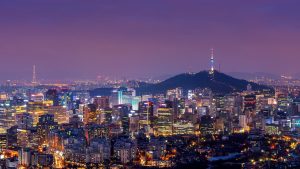
South Korea: Where Future Meets Productivity
Forget everything you think you know about internet speed ,South Korea will blow your mind.
This isn’t just fast internet; this is internet that downloads entire seasons of shows before you can finish saying “buffering.”
For digital nomads whose livelihood depends on reliable connectivity, Korea is like finding the holy grail.
The Work-Life Reality
Seoul hits you like a caffeine rush that never crashes.
The city runs on pure energy, with 24/7 convenience stores that stock everything from instant ramen to business shirts, and coffee shops that transform into impromptu offices where the Wi-Fi is faster than most people’s home connections.
Night owls will love how the city accommodates different schedules, many cafés stay open until 2 AM, perfect for those awkward client calls with the other side of the world.
The coworking scene here isn’t just about desk space; it’s about joining Korea’s innovation culture.
Spaces like WeWork Gangnam and Fastfive offer more than just desks, they’re networking goldmines where you might end up collaborating with the next big Korean startup.
Monthly memberships run $200-350, but the value goes way beyond the workspace.
Busan offers a compelling alternative if Seoul’s intensity feels overwhelming. Korea’s second city combines excellent infrastructure with coastal vibes, and the cost of living drops significantly while the quality of life arguably improves.
Your Wallet Will Thank You (Sort Of)
Let’s be honest—Korea isn’t Thailand-cheap, but it’s Tokyo-expensive either.
Your monthly budget will likely hit $1,800-2,800, which might sound steep until you experience what you get for that money.
We’re talking about subway systems so efficient they make Swiss trains look sluggish, healthcare that’s both world-class and affordable, and a food scene that ranges from $3 street food that’ll ruin you for hot dogs forever to Michelin-starred restaurants that won’t require a second mortgage.
Housing costs vary dramatically by location.
A studio in trendy Hongdae might cost $1,000, while the same money gets you a spacious one-bedroom in up-and-coming neighborhoods like Seongsu.
Pro tip: many nomads opt for monthly furnished rentals through platforms like Airbnb for flexibility, though long-term leases offer better value.
Culture Shock (The Good Kind)
Korea will challenge every assumption you have about work-life balance and social interaction.
The concept of “nunchi”,the art of understanding situations and people’s moods, permeates everything from business meetings to casual coffee shop encounters.
You’ll find yourself developing a sixth sense for social dynamics that’ll serve you well long after you leave.
The food culture alone justifies the visa paperwork. Korean BBQ isn’t just dinner; it’s a social ritual that’ll teach you more about Korean culture than any guidebook.
And once you’ve experienced the efficiency of Korean convenience stores, where you can pay bills, buy concert tickets, and grab a surprisingly good meal, you’ll wonder why the rest of the world hasn’t figured this out yet.
The Visa Game
Korea’s recently launched Digital Nomad Visa is a game-changer, allowing stays up to two years for qualifying remote workers.
The requirements are reasonable: proof of income (around $60,000 annually), health insurance, and employment with a foreign company.
For shorter stays, most nationals get 90-day tourist visas, perfect for testing the waters.
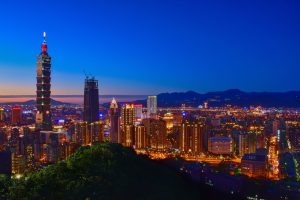
Taiwan: Asia’s Best-Kept Secret
If Korea is the overachiever, Taiwan is the effortlessly cool kid who turns out to be brilliant.
This island nation has quietly built one of Asia’s most nomad-friendly environments while maintaining an authenticity that feels increasingly rare in our Instagram-obsessed world.
Living the Island Life
Taipei doesn’t try to impress you with flashy skyscrapers or designer districts, it wins you over with substance.
The MRT system is so clean and efficient that you’ll find yourself taking random rides just for fun.
The city’s café culture rivals Melbourne’s, with spaces like Notch Coffee and Simple Kaffa serving beans that’ll make you rethink your relationship with Starbucks.
What sets Taiwan apart is its accessibility.
The entire island is smaller than most US states, meaning weekend adventures to dramatic coastlines, indigenous mountain cultures, or traditional fishing villages are always within reach.
Hot springs, night markets, and hiking trails become part of your routine rather than special occasions.
The coworking scene is growing rapidly, with spaces like The Hive and CIT offering not just desks but community.
Taiwan’s nomad network is tight-knit and welcoming, expect invitations to hiking groups, language exchanges, and startup events within your first month.
Money Matters (In Your Favor)
Taiwan delivers exceptional value, with monthly costs ranging $1,400-2,200 for a lifestyle that includes modern housing, fantastic food, and weekend adventures.
Accommodation costs are reasonable—$700-1,200 gets you a comfortable apartment in Taipei’s best neighborhoods, while $500-800 covers nice places in other cities.
The food scene is Taiwan’s secret weapon.
Night markets offer incredible variety for $2-5 per meal, while mid-range restaurants serve cuisine that would cost three times as much in Western cities.
Don’t even get me started on the fruit, when mangoes and dragon fruit become casual snacks, you know you’re living right.
Healthcare deserves special mention.
Taiwan’s National Health Insurance system is affordable and comprehensive, offering peace of mind that’s worth its weight in gold for nomads concerned about medical emergencies.
Cultural Immersion
Taiwan’s cultural identity is fascinatingly complex, Chinese heritage mixed with Japanese influence, indigenous traditions, and modern democratic values.
This creates an environment that’s both familiar and exotic, comfortable yet constantly surprising.
The Taiwanese people embody genuine warmth that goes beyond polite service.
Expect strangers to help with directions, restaurant owners to recommend their best dishes, and fellow train passengers to share snacks.
This isn’t tourism theater, it’s authentic cultural hospitality.
Language-wise, Mandarin dominates, but English proficiency is high in urban areas.
Many nomads find Taiwan an ideal place to start learning Chinese, with patient locals and numerous language exchange opportunities.
Visa Simplicity
Most nationalities get 30-90 days visa-free, perfect for nomad trial runs.
For longer stays, Taiwan offers various options including the Gold Card program for skilled professionals, which provides a pathway to residency for qualifying applicants.
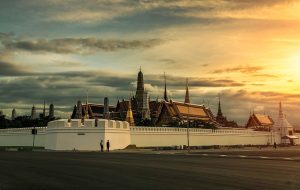
Thailand: The Nomad Paradise That Started It All
Thailand didn’t invent digital nomadism, but it might as well have.
This tropical powerhouse has been perfecting the nomad experience for over a decade, creating an infrastructure and community that makes remote work feel effortless while keeping life exciting.
The Nomad Infrastructure
Bangkok is nomad central command, a metropolis where ancient temples share streets with ultramodern coworking spaces, and where you can attend a blockchain meetup in the morning and explore floating markets in the afternoon.
Areas like Silom and Sukhumvit have evolved specifically to serve the nomad community, with everything from short-term apartments to reliable laundry services designed around remote workers’ needs.
But Thailand’s genius lies in its diversity.
Chiang Mai offers mountain air and significantly lower costs, making it perfect for nomads building their businesses or writing that novel.
The islands provide the ultimate work-from-paradise experience, though be prepared for higher costs and occasional internet hiccups during monsoon season.
Coworking spaces here aren’t just offices, they’re community centers.
Hubud in Ubud and Dojo Bali (okay, that’s technically Indonesia, but the concept applies) pioneered the community-focused coworking model that Thailand has perfected.
Expect networking events, skill-sharing workshops, and friendships that outlast your visa.
Budget Stretching Mastery
Thailand’s affordability borders on the ridiculous.
Monthly expenses of $1,000-1,800 can fund a lifestyle that would cost $4,000+ in major Western cities.
We’re talking about beachfront workouts, daily massages, diverse cuisine, and comfortable accommodation without financial stress.
Accommodation options span from $20 hostels for the ultra-budget conscious to $100+ luxury condos for those wanting resort-style amenities.
The sweet spot for most nomads sits around $400-800 monthly for comfortable, well-located apartments with reliable internet and air conditioning.
Food costs practically round to zero.
Street food delivers incredible variety for $1-3 per meal, while restaurant dining ranges $5-15.
The abundance of fresh tropical fruits, spices, and seafood means you’ll eat better than you did at home while spending less than your previous coffee budget.
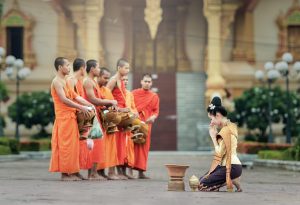
Cultural Richness
Thailand’s Buddhist culture creates an underlying philosophy of “mai pen rai” (no worries) that becomes infectious.
The emphasis on mindfulness, respect, and finding joy in simple pleasures provides a counterbalance to the hustle culture that many nomads are escaping.
The country’s cultural diversity is staggering, from the Lanna culture of northern Thailand to the Malaysian-influenced south, each region offers distinct experiences.
Temple visits become meditation opportunities, cooking classes turn into cultural education, and local festivals provide community experiences that remind you why travel matters.
Visa Evolution
Thailand’s visa policies have evolved significantly to accommodate nomads.
The new Long-Term Resident visa offers exciting possibilities for qualifying professionals, while traditional tourist visas still provide flexibility for shorter stays.
Visa runs to neighboring countries have been a nomad rite of passage, often leading to unexpected adventures in Cambodia or Laos.
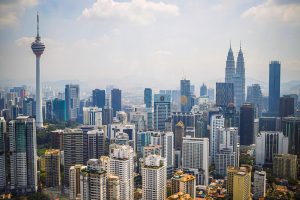
Malaysia: The Multicultural Gateway
Malaysia flies under the radar in nomad discussions, which is exactly why smart nomads are flocking here.
This multicultural nation offers a unique combination of first-world infrastructure, developing-world prices, and a cultural diversity that makes every day feel like a mini world tour.
Urban Sophistication Meets Tropical Ease
Kuala Lumpur surprises visitors with its sophistication.
The Petronas Towers aren’t just Instagram props—they anchor a modern city with world-class infrastructure, efficient public transport, and a growing tech ecosystem.
Neighborhoods like KLCC and Mont Kiara cater specifically to international professionals, offering everything from coworking spaces to international schools.
Penang provides an alternative that many nomads prefer,George Town’s UNESCO World Heritage status means living among stunning colonial architecture while enjoying some of Asia’s best street food.
The island’s compact size makes everything walkable, while the mix of cultures creates an incredibly rich daily experience.
Coworking spaces in Malaysia focus heavily on tech and entrepreneurship, making them ideal for nomads in these fields.
Many spaces offer programs connecting nomads with local businesses and investment opportunities.
Economic Sweet Spot
Malaysia hits the economic sweet spot, developed enough for convenience, affordable enough for comfort. Monthly costs range $1,200-2,000, with the ringgit’s favorable exchange rates making everything feel like a bargain for nomads earning in stronger currencies.
Housing costs are particularly attractive, with modern condos in prime locations available for $500-900 monthly.
Many come with amenities like pools, gyms, and 24-hour security that would cost thousands extra in Western cities.
The multicultural food scene is Malaysia’s crown jewel.
Chinese breakfast, Indian lunch, and Malay dinner isn’t just possible, it’s a typical Tuesday. Night markets, hawker centers, and food courts offer incredible variety for $2-6 per meal.
Cultural Fusion
Malaysia’s multiculturalism isn’t just about different restaurants, it’s about experiencing multiple worldviews simultaneously.
Islamic architecture neighbors Chinese temples and Indian cultural centers, creating a daily education in religious and cultural diversity.
English proficiency is excellent due to colonial history and international business focus, making integration smooth for English-speaking nomads.
The business culture blends Asian relationship-building with Western efficiency, creating networking opportunities that feel both productive and authentic.
Strategic Advantages
Malaysia’s location makes it an ideal base for exploring Southeast Asia, with budget airlines connecting to dozens of regional destinations.
The MM2H (Malaysia My Second Home) program offers long-term residency options for qualifying applicants, making it possible to establish a real base rather than just passing through.
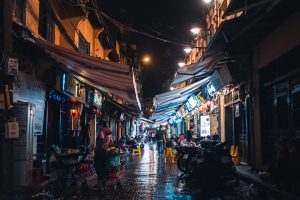
Vietnam: The Phoenix Rising
Vietnam represents nomad opportunity in its purest form, a country transforming at breakneck speed while maintaining its authentic character.
The energy here is palpable, driven by a young population determined to build their future while honoring their past.
Controlled Chaos
Ho Chi Minh City embodies controlled chaos, millions of motorbikes somehow navigate streets that seem to follow no traffic rules, yet everything works.
The city’s energy is addictive, with coffee culture that puts Italian cities to shame and a startup scene that rivals Silicon Valley for enthusiasm if not funding.
Districts 1 and 3 serve as nomad headquarters, with coworking spaces, international restaurants, and Western amenities concentrated in walkable areas.
The motorbike culture might seem intimidating initially, but mastering city navigation on two wheels becomes a badge of honor and practical necessity.
Hanoi offers a completely different experience, more traditional, more political, more connected to Vietnam’s complex history.
The Old Quarter’s narrow streets and traditional architecture create an atmosphere that feels both ancient and vibrantly alive.
Da Nang and Hoi An represent Vietnam’s coastal appeal, offering beach lifestyle with growing nomad infrastructure.
The pace is slower, costs lower, and the combination of beach and mountains provides incredible weekend options.
Unbeatable Value
Vietnam delivers the best value proposition in Asia, possibly the world.
Monthly costs of $800-1,400 fund lifestyles that include modern accommodation, diverse dining, transportation, and entertainment.
We’re talking about living well on budgets that wouldn’t cover rent in most Western cities.
Accommodation costs are almost comically low, $400-700 monthly secures modern apartments in prime locations, while $200-400 covers nice places in secondary areas.
Many nomads opt for serviced apartments that include cleaning and utilities, simplifying the logistics of temporary residence.
Food costs approach zero if you embrace local cuisine.
Vietnamese street food offers incredible variety for $2-4 per meal, while restaurant dining ranges $5-12.
The coffee culture alone justifies the visa paperwork, Vietnamese iced coffee becomes a daily ritual that costs less than a single Starbucks drink.
Cultural Intensity
Vietnam doesn’t coddle visitors, it challenges them to engage with a culture that’s simultaneously ancient and rapidly modernizing.
The resilience and optimism that define Vietnamese culture become infectious, creating an environment where personal growth feels inevitable.
The country’s complex history creates layers of cultural understanding that reveal themselves gradually.
French colonial architecture neighbors traditional pagodas, while modern startup offices occupy buildings that have witnessed decades of dramatic change.
Vietnamese cuisine varies dramatically by region, making food exploration a compelling reason to travel domestically.
Pho in Hanoi differs significantly from Ho Chi Minh City versions, while central Vietnamese cuisine offers completely different flavor profiles.
Emerging Opportunities
Vietnam’s rapid economic growth creates opportunities for nomads beyond just affordable living. The startup ecosystem is exploding, with increasing venture capital investment and government support for entrepreneurship.
English teaching opportunities abound for native speakers, while translation and consulting work exists for those with Vietnamese language skills.
The visa situation continues improving, with multiple-entry options and longer-term possibilities for qualifying applicants.
Many nomads combine Vietnam with other Southeast Asian countries, using it as a base for regional exploration.
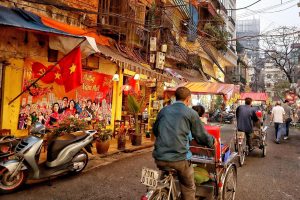
Making Your Asian Adventure Reality
Choosing your Asian nomad destination isn’t just about comparing costs and internet speeds, it’s about matching your personality, goals, and dreams with environments that’ll help you thrive.
Each country offers a different path to the same destination: a life where work funds adventures rather than just paying bills.
The beauty of nomadism in Asia lies in the region’s interconnectedness.
Start with one country, establish your routine, then expand your horizons.
Many successful nomads develop seasonal patterns, Thailand’s cool season, Korea’s spring, Taiwan’s autumn, creating year-round optimal conditions.
Consider your professional needs carefully.
Tech workers might gravitate toward Korea’s innovation culture, while creative professionals often find inspiration in Vietnam’s energy or Taiwan’s authentic charm.
Client time zones matter too, Asian locations work well for Australian and European clients but can be challenging for American time zones.
Budget considerations extend beyond monthly expenses to visa costs, flights, and setup expenses.
Countries with longer visa options reduce the hidden costs of visa runs and constant movement.
Consider the total cost of nomadism, not just daily expenses.
Most importantly, remember that digital nomadism in Asia isn’t just about working remotely, it’s about personal transformation.
The challenges of navigating new cultures, languages, and systems develop resilience and adaptability that benefit both professional and personal growth.
The infrastructure exists, the communities are welcoming, and the opportunities are endless.
Your Asian nomad adventure is limited only by your willingness to take the leap.
Whether you choose Korea’s efficiency, Taiwan’s authenticity, Thailand’s ease, Malaysia’s diversity, or Vietnam’s energy, you’re not just changing your location, you’re upgrading your entire life experience.
The question isn’t whether Asia is right for digital nomads, it’s which Asian adventure matches your vision of the life you want to build.
Pack your laptop, embrace the unknown, and prepare for the adventure that’ll make your old office life seem like a distant memory.
Your future self is waiting in a café somewhere in Asia, wondering what took you so long to arrive.